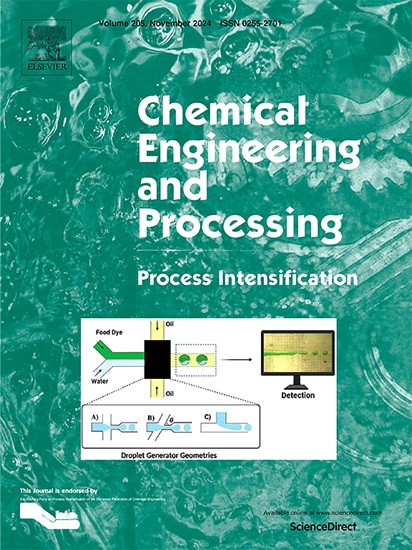Process intensification control: Advancing efficiency and sustainability, a review
IF 3.8
3区 工程技术
Q3 ENERGY & FUELS
Chemical Engineering and Processing - Process Intensification
Pub Date : 2025-06-01
DOI:10.1016/j.cep.2025.110388
引用次数: 0
Abstract
Process intensification has revolutionized chemical process design by integrating reaction and separation, enhancing efficiency, reducing energy consumption, and promoting sustainability. However, these advancements introduce significant control challenges due to increased process complexity, nonlinear interactions, and dynamic constraints. Over the past 25 years, conventional control strategies have been progressively replaced by predictive, adaptive, and data-driven methods, which are better suited for managing multivariable interactions and real-time optimization. The widespread adoption of predictive control frameworks has improved stability, reduced response times, and enhanced energy efficiency in reactive and extractive distillation, dividing-wall columns, and hybrid separation processes. Furthermore, integrating intelligent decision-making tools has enabled real-time adaptability, ensuring robust performance under fluctuating operating conditions. The emergence of hybrid control strategies, which combine predictive models with data-driven learning techniques, has further enhanced the ability to address nonlinearities and process uncertainties. This shift underscores a transition toward more intelligent and sustainable process operations, where control systems not only optimize efficiency but also minimize emissions and improve resource utilization. As process intensification continues to advance, future research should focus on scalable, autonomous, and computationally efficient control solutions to ensure operational reliability and economic feasibility in sustainable chemical manufacturing.

过程强化控制:提高效率和可持续性,综述
过程强化通过整合反应和分离、提高效率、降低能耗和促进可持续性,彻底改变了化学过程设计。然而,由于过程复杂性、非线性相互作用和动态约束的增加,这些进步带来了重大的控制挑战。在过去的25年里,传统的控制策略已经逐渐被预测、自适应和数据驱动的方法所取代,这些方法更适合于管理多变量交互和实时优化。预测控制框架的广泛采用提高了反应蒸馏和萃取蒸馏、隔壁塔和混合分离过程的稳定性,缩短了响应时间,并提高了能源效率。此外,集成智能决策工具实现了实时适应性,确保了在波动的操作条件下的稳健性能。混合控制策略的出现,将预测模型与数据驱动的学习技术相结合,进一步增强了处理非线性和过程不确定性的能力。这种转变强调了向更智能和可持续的过程操作的过渡,其中控制系统不仅可以优化效率,还可以最大限度地减少排放并提高资源利用率。随着过程集约化的不断推进,未来的研究应侧重于可扩展、自主和计算高效的控制解决方案,以确保可持续化学制造的运行可靠性和经济可行性。
本文章由计算机程序翻译,如有差异,请以英文原文为准。
求助全文
约1分钟内获得全文
求助全文
来源期刊
CiteScore
7.80
自引率
9.30%
发文量
408
审稿时长
49 days
期刊介绍:
Chemical Engineering and Processing: Process Intensification is intended for practicing researchers in industry and academia, working in the field of Process Engineering and related to the subject of Process Intensification.Articles published in the Journal demonstrate how novel discoveries, developments and theories in the field of Process Engineering and in particular Process Intensification may be used for analysis and design of innovative equipment and processing methods with substantially improved sustainability, efficiency and environmental performance.

 求助内容:
求助内容: 应助结果提醒方式:
应助结果提醒方式:


